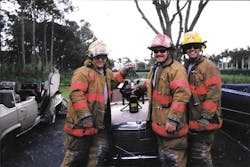After 31 years of fun and adventure, I retired from Palm Beach County Fire Rescue at the end of May. I spent the last month visiting as many stations and crews as I could. As I was eating an amazing firehouse dinner with my brothers at Station 23 (The Rock) one night, I listened to the variety of conversations and looked around at the diversity in experience in the room, ranging from a probie to officers with over 20 years of know-how. I suddenly realized that over the course of my fire service career, I acquired an assortment of both physical and mental skills that have helped me be a ready firefighter and a servant leader.
Be Ready For Anything
The fire service is a dangerous business. People, both the ones we serve and the ones we serve with are counting on us. When the community calls, whether they’re a mother with two children trapped inside of a locked apartment filled with thick, black smoke or a lonely grandmother who just wakes up scared late at night and needs some reassurance, they are counting on us. We represent hope for them and we have to be ready. We can’t just settle for competence; we have to be masters at what we do. We have to be ready for anything. We have to be ready firefighters.
From day one at the fire academy and throughout my career, I learned those obvious skills required for every firefighter — maintaining and operating tools and equipment, driving apparatus, stretching hoselines, aiming fire streams, opening a roof with an axe (now a saw), removing glass from windows, crawling through a house filled with smoke, and many more things. And because we’re a “fire rescue” service, I learned the EMS skills every paramedic uses to save lives — patient evaluation, intubating, starting IVs, giving medications and defibrillating patients. I had to be a master at what I do. I had to be ready for anything.
Put Others First
When followers work in complex and dangerous situations, leadership makes the difference between life, injury, or death. Those firefighters at risk desperately need leadership who looks out for them — they need servant leaders.
Becoming a company or chief officer meant that I've gotten good at other things — communicating effectively by talking to people, listening to them, and understanding them. I developed into a fast, effective decision maker, employing sound judgement and logical reasoning, and using resources wisely in chaotic conditions. I became a motivator, in good times and bad, inspiring and guiding others toward goals and objectives. I created detailed, executable plans for training, inspections, and other operations. I learned to assess situations and people to facilitate constant improvement. I grew other leaders, investing time and effort to develop their individual leadership skills. I became a builder of teams, spending time and resources to help them get better. I stayed curious and came to be a continuous learner, seeking self-improvement and organizational growth, while remaining adaptable, envisioning the future, and helping lead change. I truly believed that to ensure a safer organization that continues to get better, I had to put others first.
I guess my simple message is this: maintain your skills and work to improve them. Stay curious, keep exploring and discovering, and continue to learn and grow. Always think of others and put them first. It takes both physical and mental skills to be a ready firefighter and a servant leader.
Mentoring
Mentoring has been a crucial part of my safety and success in the fire service. It’s been wonderful to have a variety of people over the years that I could observe. They included firefighters and civilians from all ages and life experiences. My mentors had been places I’d never been, read books or listened to leaders I hadn’t heard of, and done things I had never done. Many of them experienced the pain and processes that I would go through, and there was a lot I learned from them. I believe I was able to take away many lessons from them to help me work with and lead firefighters.
How did I find my mentors? It really wasn’t through any official program or plan I developed. I just stayed curious, so it came pretty easy and naturally. They were people with the same general passions that I had: always trying to do their best, to work better with others, and to find ways to help others. Here are a three ways I found them:
- They were accessible to me — they were other firefighters, officers, teachers, community leaders, and friends and family. They were people I worked with, worked for, and met casually, sometimes in a store or coffee shop.
- They were people I met when I traveled — I attended the National Fire Academy and many conferences and seminars where I met new people who enriched my thinking and world view.
- They were people I listened to or read about — some were speakers I watched on TED videos, while others I found in an assortment of books I read, from fiction to biographies to business.
Mentoring relationships are valuable. They don’t have to be complicated programs; they should just be simply friendships that help you shape your future.
BILLY SCHMIDT, MS, recently retired as a battalion chief with Palm Beach County Fire Rescue in Florida, serving as commander of the 3rd Battalion. He has instructed several PBCFR training programs, including the department’s Recruit Academy and Officer Development Academy. He writes and speaks on leadership and performance topics and is a member of the IAFC Safety Health & Survival Section. He teaches incident management programs at the National Fire Academy and leadership graduate programs at Palm Beach State College. He is the author of firegroundworks.com, an education blog dedicated to growing adaptable and agile leaders. He can be reached at [email protected].





